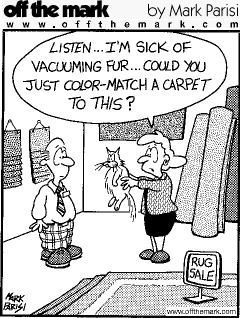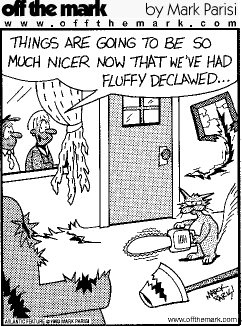Our Bev’s blog of today is quite interesting. It starts by describing her Mother’s talent with verbal abuse. Then, oddly, it segs into the tenuous relationship we share. I think the most interesting aspect is that “…Kitty … can carry on an interesting conversation (when she’s not trying to TEACH us something.)”
Bev and I are both “60s” people, but of different kinds. I never bought into it. I preferred to do “my thing” rather than join in the “sexual revolution,” public protest (after I got arrested in a public protest, I changed my mind about herd mentality), the “me” philosophy and, generally, the whole 60s thing that I feel was the beginning of the decline of American society. How’s that for a revelation?
Another phenom of that time is “open communication.” Of all the advice that drifted down from the pop psychology of the day, the most overworked—and, I suspect, the most destructive—is the injunction to communicate. Be open, be honest, speak your mind, demand to be heard...well, yes, sometimes, maybe—if simple misunderstandings are at the root of your frustrations. But how often, really, does one person have no notion what's on the other's mind?
Communication is not just putting ideas into words. It's getting ideas across, preferably in a way that allows them to be used. Timing is crucial. But what of spontaneity? Many people believe intimate friendship means being able to say what you think: "I'm through repressing my feelings. What good is a relationship if I can't express myself?" I see the point in this objection. Women, in particular, have been forced for too long to control their responses. We may admire Jane Austen's shrewd heroines, but not even I would want to live in a world that demands such extremes of social calculation. No one should have to weigh every syllable.
All the same, self-expression often benefits from forethought. That's why writers revise. Sometimes I think the over-emphasis of immediacy in communication, as if the ideal friendship was like psychoanalysis from a patient's position, where you say (or do) whatever comes to mind without thought of consequence.
There are moments when speech is likely to damage relationships. The heart-to-heart that seems so appealing when you've had too much to drink won't do anybody any good.
You can't bring up hurtful issues, can't hope to change things for the better, if you're not on the same team. Early in a friendship, all that counts is creating trust and comfort. Solving problems through explicit negotiation makes sense only if the effort serves the prior goal of relationship building. Nonverbal communication might serve the purpose best: having fun or working side-by-side, sharing cooperative triumphs, or just being there.
None of this is to say that people can't be spontaneous or that they must suppress annoyance. One of the great problems of the nearly 50-year-old “pop psy” prescription is that they equate shaky relationships with all relationships. If the people in the relationship are resilient, smart-mouthed street fighters, they may amuse each other by saying whatever comes to mind. They may even learn something from what pops out of their mouths. But if the relationship is strained, or if it is just young and untested, one might consider paying attention to the timing of squabbles and, if you need to strike at all, waiting until the iron is cold.
Is the above a revelation about myself, or am I just teaching (AGAIN)?








